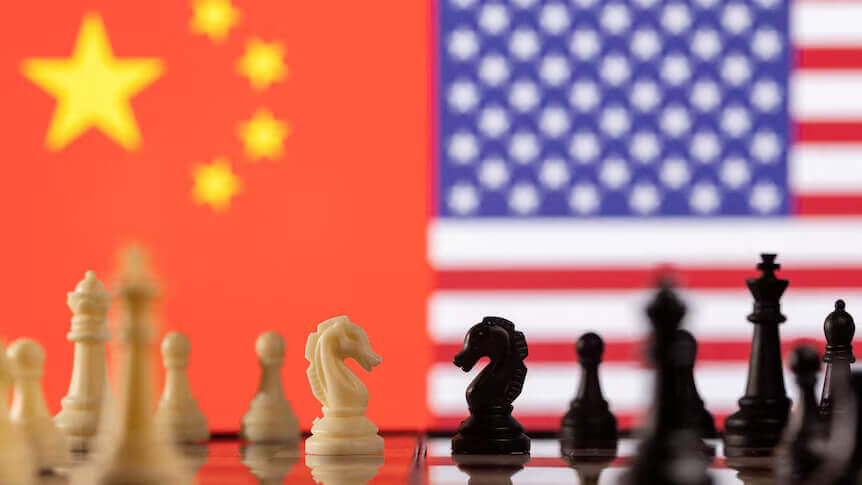China has emerged as the world’s leading diplomatic power, surpassing the US in a global ranking of diplomatic postings, according to the 2024 Global Diplomacy Index by the Lowy Institute, Australia.
Findings
The index assessed 66 nations and territories based on the number of diplomatic posts they maintain globally, and placed China at the top with 274 posts, with the US following close at 271. This slim lead underscores Beijing’s concerted efforts to expand its influence amid heightened geopolitical competition with Washington.
India
India has historically allocated comparatively fewer resources to its diplomatic network relative to its demographic and economic size, ranking just beyond the top ten countries in the Global Diplomacy Index. However, alongside Turkey, India boasts the most rapidly expanding network among all index countries, having added 11 posts since 2021. The majority of these new posts (8 out of 11) are situated in Africa, reflecting India’s increasing economic engagements in the region and its aspiration to emerge as a leader in the Global South.
New Delhi’s diplomatic presence is notably prominent in Africa, Asia, and Europe, with representation in every country across Asia, Eastern Africa, and the Indian Ocean Region. Despite this, India maintains limited diplomatic representation in the Pacific, where it operates only two posts among the Pacific Islands Forum members, excluding Australia and New Zealand.
The strategic distribution of diplomatic posts underscores India’s efforts to bolster ties with diverse regions, particularly Africa, and solidify its role on the global diplomatic stage.
Diplomatic Influence Race
The Lowy Institute’s Director of Public Opinion and Foreign Policy Program, Ryan Neelam, emphasised the significance of diplomacy as a measure of influence, noting that governments continue to invest in diplomacy to project power and achieve their interests.
“Diplomacy is often overlooked as a measure of influence, but it has never been a more important element of statecraft. The Global Diplomacy Index shows that governments continue to invest in diplomacy to project power and achieve their interests,” Neelam said.
“The ongoing rivalry between the United States and China is reflected in the superpowers’ dominance in the 2024 rankings, while geopolitical competition has propelled Asia and the Pacific into focus,” he added.
China’s diplomatic network outpaces that of the US in Africa, East Asia, the Pacific Island nations, and Central Asia. Meanwhile, the US maintains an advantage in Europe, North and Central America, and South Asia. The two powers are tied in the Middle East and South America.
China is the world's No. 1 diplomatic power, ahead of the US.
— S.L. Kanthan (@Kanthan2030) February 25, 2024
Lowy Institute - Global Diplomacy Index pic.twitter.com/E01Xmbfv5y
State Ideology and Diplomacy
During a closed-door Central Conference on Work Relating to Foreign Affairs in December, Chinese President Xi Jinping emphasised the strategic importance of promoting diplomacy aligned with China’s national interests and state ideology. He outlined six foreign policy imperatives, highlighting China’s role as a responsible major country with increased international influence.
China’s diplomatic strategy includes cultivating an intricate network of ranked “strategic partnerships.” This approach gained prominence last year, following directives from Xi during the Chinese Communist Party National Congress in October 2022. However, China’s expanding role in world affairs has incurred scepticism and concerns in the West.
Last March, China achieved notable diplomatic success by brokering the resumption of relations between Iran and Saudi Arabia. Additionally, China’s involvement in Russia-Ukraine diplomacy garnered attention, although the conflict persists.
The geopolitical landscape, marked by concurrent wars involving US partners and allies, has led to mutual calls for engagement from Beijing and Washington. Despite intensified US-China rivalry over the past decade, the two superpowers have settled on a cautious thaw, as evidenced by a four-hour summit between Xi and US President Joe Biden in San Francisco last November.
Taiwan Issue
The issue of Taiwan, however, remains a contentious point, with Beijing claiming the island as its own and Washington providing increasing support to Taipei.
The Global Diplomacy Index also sheds light on China’s efforts to isolate Taiwan diplomatically, with most of Taiwan’s 110 overseas posts not officially accredited as diplomatic missions. Recent diplomatic shifts, such as Nauru cutting ties with Taiwan to establish relations with Beijing, have left Taiwan with a dwindling number of official allies.
The report also highlights the Pacific Islands as a hotspot for geopolitical competition, with an observed surge in new diplomatic missions driven by this regional rivalry.

